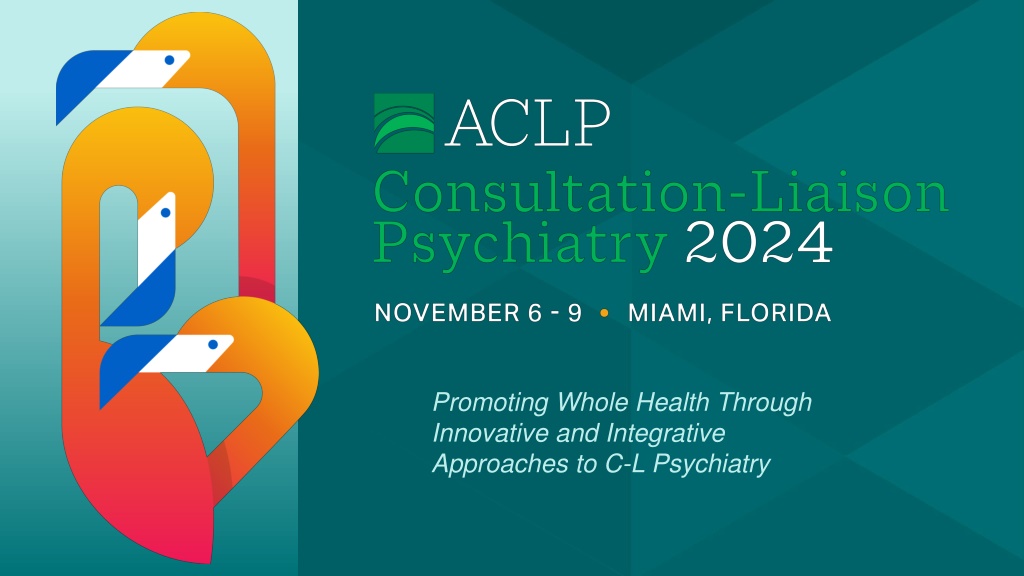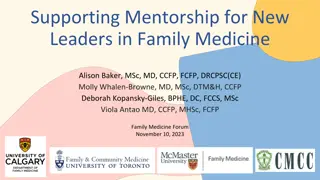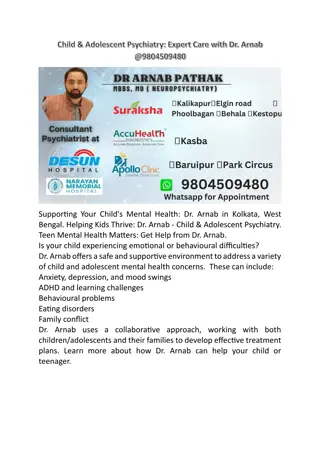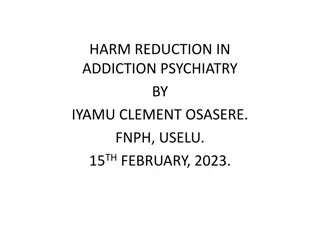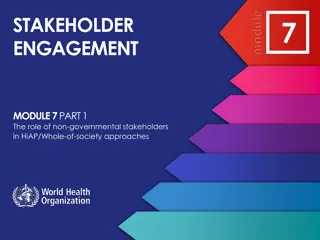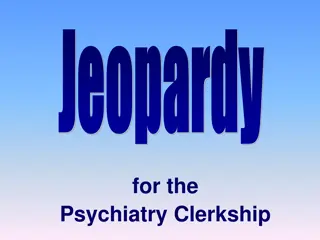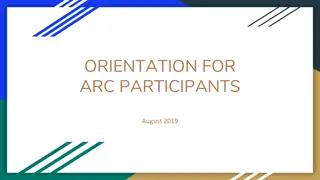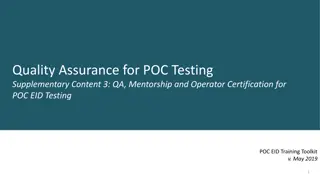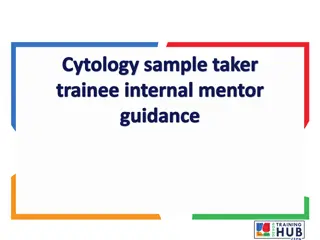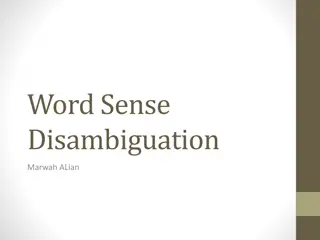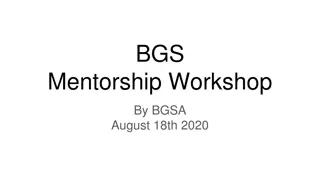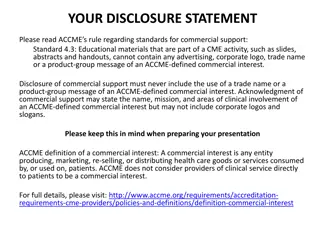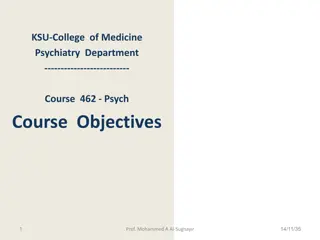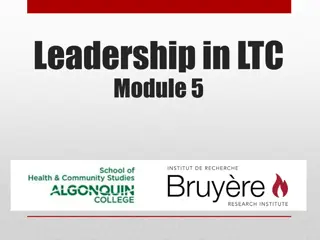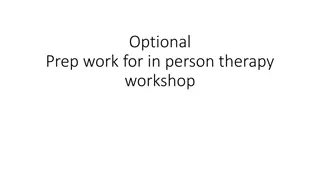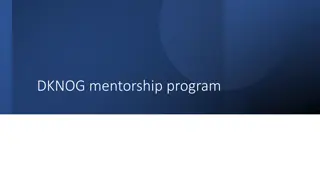Promoting Whole Health Through Innovative Approaches in C-L Psychiatry and ACLP Mentorship Workshop Series
Engage with cutting-edge strategies in promoting whole health through innovative approaches in Consultation-Liaison Psychiatry (C-L Psychiatry). Explore the ACLP Mentorship Workshop Series for developing successful annual meeting submissions. Delve into topics such as crafting impactful submissions, advancing diversity, equity, and inclusion, and enhancing advocacy skills for physicians. Discover opportunities for mentorship, networking, and professional growth at the Annual Meeting. Stay updated with the latest advancements and best practices in the field through live in-person and live-streamed sessions.
Uploaded on Oct 03, 2024 | 0 Views
Download Presentation

Please find below an Image/Link to download the presentation.
The content on the website is provided AS IS for your information and personal use only. It may not be sold, licensed, or shared on other websites without obtaining consent from the author. Download presentation by click this link. If you encounter any issues during the download, it is possible that the publisher has removed the file from their server.
E N D
Presentation Transcript
Promoting Whole Health Through Innovative and Integrative Approaches to C-L Psychiatry
ACLP Mentorship Workshop Series: Best Practices for Developing Annual Meeting Submissions Amy M. Bauer, MS, MS, FACLP Program Chair, CLP 2024 Margaret Cinderella, MD Vice Chair, General Sessions Anne Gross, MD, FACLP Assistant Program Chair, CLP 2024 Marian Fireman, MD, FACLP Chair, Preconference Courses Michael J Peterson, MD, PhD, FACLP, DFAPA Chair, Oral Papers & Posters Chandan Khandai, MD Chair, DEI Subcommittee Carrie L. Ernst, MD, FACLP Chair, Mentorship Subcommittee
Agenda Introduction and Overview Oral Papers & Posters General Sessions (Workshops & Symposia) Preconference Courses Advancing DEI through Annual Meeting submissions 10 Tips for Crafting Successful ACLP Submissions Q & A 3
ACLP Mentorship Workshop Series: Best Practices for Developing Annual Meeting Submissions Amy M. Bauer, MS, MS, FACLP Program Chair, CLP 2024 University of Washington Anne Gross, MD, FACLP Assistant Program Chair, CLP 2024 Oregon Health Sciences University
Annual Meeting Highlights Live In-Person Meeting and Live-Streamed Excellent lineup of plenary speakers Research colloquium, APP Course, Debate Promoting Whole Health Through Innovative and Integrative Approaches to C-L Psychiatry NEW! Advocacy Skills for Physicians: Leading Change in the Practice of Medicine Pre-conference course free for ACLP members NEW! Awards Toast Opportunities for Mentorship, Networking, Socializing
Annual Meeting Submissions NEW! More general sessions, oral papers, and posters = More abstracts accepted All submissions require DEIA statement Considered in assessing overall quality Promoting Whole Health Through Innovative and Integrative Approaches to C-L Psychiatry NEW! Oral Papers can be live (in-person) or recorded NEW! Max. 1 accepted poster per presenting author General Sessions (previously workshops and symposia ) 75 minutes in length with a maximum of 4 speakers Educational strategies should match the session s objectives Examples: Knowledge transfer lecture or panel, etc. Skills interactive activities or role play, etc.
Best Practices: Poster and Brief Oral Papers Submissions Michael J Peterson, MD, PhD, FACLP, DFAPA Chair Oral Papers and Posters Subcommittee University of Wisconsin - School of Medicine and Public Health
Presentation Formats Brief Oral Papers (BOPs): Short (~10 minute) presentation by a single presenter Didactic/PowerPoint presentation by primary presenter Talks are grouped by topic Moderator leads the session; introduces presentations and determines format/time for discussion component. NEW for 2024, presenters have the option for either live/in-person or recorded presentations. Poster: Work presented on a printed format In person presentation at the Meeting Poster Session Generally includes structured sections Abstract, Background, Methods, Results, Discussion/Conclusion Useful to link to additional material online (e.g. include a QR code on poster) 8
Notes on presentation formats: Well-suited to recent research results and in progress types of work. Strengthened by results, but not always publication ready Useful way to present work to get feedback before completion and/or publication Limited number of BOPs available but increasing for 2024! If a BOP submission not accepted, option to review as a poster Many more posters accepted than other presentation types 9
What makes a good submission? (Writing a good abstract) Abstracts are only 450 words, so clear and concise writing is critical! Clear aims Clear relevance to CL Psychiatry, contribution to the field Study design / scientific rigor Complete data and appropriate statistical analysis 10
Abstract Background/Significance Methods Results Incomplete data: you will be asked to attest you expect to have data by presentation Results will be omitted for case reports Discussion Conclusions/Implications References (2-5) **Prior Publication: work cannot be published before April 2024; if presented elsewhere, novel content must be described. Publication/presentation between April and November 2024 must be cited in presentation/poster. 11
Authors Take care when entering authors/co-authors for oral papers and posters, as you are not permitted to make additions and/or substitutions, nor change the order of authors, after the submission deadline. The Presenting Author designation can be assigned to any author associated with the submission and can be changed up to the week before the meeting starts. 12
Specifics on Case Reports Case should be novel: Unusual etiology or presentation New clinical approach, interpretation/theory, or learning point Discussion and interpretation should be based on existing literature and clinical science. Consider the following points: Is there a point of view/angle/teaching point that is clearly described? Is the point of view supported through both the description of the case and relevant review of the literature? Is there a rationale for the point of view (i.e., some discussion of alternate points of view, or why this point of view was chosen) 13
Brief Oral Papers Best place at the meeting to present original research and disseminate new developments in C-L Psychiatry. Meaningful literature reviews on a topic, with or without an included case, may be considered if the content is considered to contribute in an important way to the available literature. More competitive given fewer slots 14
Posters Early projects Case reports Topic review Most common trainee presentation Great opportunity for networking! One of the authors is the designated presenter. NEW for 2024 - A single person may be Presenting Author on only ONE (1) accepted poster. If multiple posters are accepted, an alternate Presenting Author must be identified from the authors, or other posters should be withdrawn. 15
Trainee Status (Posters) To be considered a Trainee Poster and eligible for a Trainee Poster Award: Trainee designation refers to students, residents, and fellows Must be at trainee level at time of submission Trainee must be a substantial contributor to the work Trainee must be the first author on the abstract, and the presenter of the poster at the ACLP meeting. 16
Evaluation of submissions Criteria Clinical Applicability (Relevance to CL Psychiatry) Originality Scientific rigor (design, data, analysis) Clarity of writing DEI Contribution (content and/or presenter(s)) In person (posters): Knowledge of project/content Answers to questions from reviewer 17
Mentoring In house Trainees make use of your co-authors/mentors involved with the project Due to the number of poster abstracts, specific feedback/comments to abstracts not accepted can t be provided. 18
Poster Awards Complete poster must be uploaded by October 14, 2024 (deadline to be eligible/graded. On site grading component at the live poster session Award categories: General Poster Award Trainee Poster Award Case Report Poster Award 19
Questions? Ideas? Email: mpeterson2@wisc.edu 20
Best Practices: Workshops & Symposia (General Sessions) Natalie Jacobowski, MD Chair, General Sessions Committee Assistant Professor, Ohio State School of Medicine Nationwide Children s Hospital Margaret Cinderella, MD Vice-Chair, General Sessions Committee Cone Health Hospital
Major changes for 2024 Workshops & Symposia General Sessions Will still specify in-person or virtual 90 minute length 75 minute length Maximum 5 speakers maximum 4 speakers ~45 live sessions ~65 live sessions
General guidance on general sessions Majority of content targeted to general CL psychiatrists Presentations that incorporate the theme will be prioritized: Promoting whole health through integrative approaches Consideration of holistic perspective Focus on evidence-based practice Presenters should attempt to address healthcare inequities in the topic being presented Speaker roster should reflect the diversity of our Academy via speakers of diverse identity, geography, institution, and career stage
Major items the reviewers are considering when scoring abstracts Topics of broad interest to the C-L Psychiatry community and relevance to the annual meeting theme. Ability to enrich participant engagement and interactivity Originality (not previously presented or published, unique topics and ideas) and diversity of topics Abstract strength (more to come on future slides!) Content appropriate for duration of 75 minutes Panel diversity and potential for COI Hot, timely topics identified by general session committee members include: clinical innovation (i.e. interventional psychiatry) business/nonacademic implementation of our training
What are the features of a well written abstract proposal? General Features Well-organized and well-written Clearly defines the content and timeline/plan for the presentation Background Content outline Individual speaker topics (what value does the speaker bring; why is the speaker the right person, with the right role, and at the right time to discuss this?) Timeline (who does what?) Learning objectives 500-word limit (includes references!)
An example of a well written abstract: As C-L psychiatrists straddle the world of medicine and psychiatry, we must stay abreast of updates in medicine and maintain clinical skills that keep us relevant in the hospital and in outpatient integrated care clinics. Because of the overlap between psychiatry and neurology, many C-L psychiatrists do neurological exams during their evaluations and should have a working knowledge of neuroradiology to think through diagnoses and make recommendations. This session presents a review of neuroimaging modalities (CT, CTA, MRI, MRA); the radiologic neuroanatomy relevant to psychiatry; the correlation of clinical presentations and different anatomical regions of the brain; and findings on imaging. The session will review neuroimaging modalities including CT and MRI of the head with and without contrast, CTA and MRA and the indications for recommending imaging studies in different clinical presentations. We will present a standardized technique on how to review imaging and identify the most common neuroanatomy. Correlates of the neuroanatomy to clinical presentation including psychiatric and neurologic symptoms will be solidified by reviewing with clinical cases and their imaging.
An example of a well written abstract: Examples of cases include: 1) Imaging of a patient with frontal lobe injury and review of different areas of the of prefrontal cortex; 2) Review of imaging of 5 different patients with strokes in order to teach pertinent circulation, neuroanatomy and sequelae of aphasia and psychiatric symptoms; 3) Review of unusual cases such as an subdural hematoma and a meningioma both resulting in mania, and imaging of patients with depression with various radiological findings 5) Review of serial MRIs of patients with neurocognitive disorder and discussion of age appropriate findings. Dr. Meguid, a neuropsychiatrist, will moderate and introduce the session. The session will start with a 30- minute primer on the basics of neuroradiology and instructions on how to read CT and MRI of the brain lead by Dr. Bhairav from the department of radiology. For the case based portion of the workshop (45 minutes), Drs. Emery and Posada (inpatient CL psychiatrists) will engage the audience in an interactive session using a polling software. Using open-ended and multiple choice questions, the attendees will be asked to identify different areas of the brain and correlate neuroimaging with the associated neurological or psychiatric functions/symptoms of the cases. The last 15 minutes of the workshop, will be a Q&A with the speakers.
Abstract (continued) Learning Objectives: The participants will be able to identify when neuroimaging should be recommended and which modality to recommend. The participants will be able to identify neuroanatomical regions of the brain involved in typical C-L psychiatry cases and their correlation to psychiatric and neurological symptoms. The participants would be able to learn and practice the skill of identifying certain neuroanatomy in session through looking at real-life cases and imaging
What type of abstracts are generally not accepted? Proposals that: Promote only one institution/program Lack clear learning objectives Session format does not match learning objectives* Contain insufficient content to fill 75 minutes Include only 1-2 presenters Lack originality Single case reports or otherwise more appropriate for another format
Review Process 1st round reviews conducted by ACLP members with content area expertise (i.e. crowdsourcing) Highest and lowest scoring abstracts accepted/rejected at this stage 2nd round reviews conducted by members of workshop and symposia subcommittee who consider overall program content Increased emphasis on transparency moving forward 40% of abstracts accepted for the meeting (in 2023) 146 abstracts submitted; 129 for live workshops, 16 submitted for virtual symposia 45 live workshops selected, 12 virtual symposia selected Some presenters asked to change format if indicated based on review
Best Practices: Preconference Courses Marian Fireman, MD, FACLP Chair Preconference Courses Subcommittee Oregon Health & Science University
When? Wednesday November 6th 2024 Afternoon 1pm to 5pm Who? Audience Can be any attendee at any level of training or career Extra fee is required for these courses Faculty Must be faculty members at their institution MD/DO/APP Limit of five faculty No trainees (including fellows) Current fellows who will be faculty by the meeting date are OK must note this on the submission One faculty member should be a Member of the Academy and a mid/senior level recognized expert in the field Preconference Skills Courses
What? Submissions should be courses that teach relevant clinical skills Examples of successful courses in the past EKG assessment Assessment of the complex critical care patient Courses should be interactive! Involve your audience! Courses that are largely didactic will be asked to revise Consider submissions that will appeal to a wide audience and will attract attendees How to submit Usual abstract submission process Prerecorded content, prior work may be elements of the submission (but still no more than 5 presenters in total including those in the live session) Preconference Skills Courses
Elements of a successful abstract Interest Originality Teaching of skills how will this be done? How will time be spent? Abstract is well written Speaker strength Expertise of the speakers Clinical skills and ability to teach Speakers from more than one institution No speaker can participate in more than one skills course No speaker can be involved in the Research Colloquium Deadlines Slides for all accepted courses due by WEDNESDAY AUGUST 28TH Committee will review and give feedback on the slides Please send revisions in a timely fashion! Preconference Skills Courses
Best Practices: Integrating Diversity, Equity, and Inclusion into Submissions Chandan Khandai and Ariadna Forray Co-Chairs, Diversity, Equity and Inclusion (DEI) Subcommittee
Returning for 2024: Integrating DEI Into the Program ACLP remains committed to Diversity, Equity, and Inclusion (DEI), and encourages submissions to include one or both of the following: 1. Address inequities in the information presented, including, but not limited to, ways in which the topic impacts individuals from historically marginalized groups. 2. Speaker panels should reflect the diversity of our Academy, including participation from speakers of diverse identity, professional background, geography, institution, and career stage. All submissions require a response to the question (100 word limit): How or why your submission does or could advance diversity, equity, and inclusion, in topic presented, and/or speaker panel?
Contributions to Diversity, Equity, and Inclusion (DEI) Can Take Many Forms
DEI in Topics Presented Document and critique health and healthcare disparities within the clinical topic(s) presented Discuss ways to promote health equity, reduce health and healthcare disparities, and improve the health of historically marginalized populations, within the clinical topic(s) presented If no research/evidence exists on health and healthcare disparities on the clinical topic(s) presented, discuss why and suggest targets for future study Present examples of public service for diverse populations, e.g.,: educational presentations, outreach, partnerships with community-based organizations with the goal of improving health and wellness in communities Incorporate health and healthcare disparities, health equity, structural competency into core educational content Develop or use pedagogies that address different learning styles and/or learning disabilities Advance equitable access to education and outreach for historically marginalized groups Develop and utilize resources and tools that encourage the recruitment and retention of diverse learners, faculty and staff Assist attendees from historically marginalized groups toward academic and professional advancement within their institutions and ACLP
DEI in Speaker Panel Include speakers of diverse identity, including but not limited to: age, race, ethnicity, gender identity, sexual orientation, immigration status, disability Incorporate speakers from different professional backgrounds: non-psychiatrist physicians, advance practice practitioners, social workers, nurses, PT/OT, basic scientists, engineers, etc. Include speakers from varying career stages: trainee, early career, mid-career, late career Mentor and sponsor speakers from earlier career stages, historically marginalized groups
DEI Statement: Example Significant racial disparities have been well-described in multiple stages of the transplant process. In particular, Black and Hispanic/Latinx patients are more likely than White patients to be declined transplantation due to the psychosocial evaluation (Deutsch-Link, American Journal of Transplantation, 2023). This evaluation presents a critical opportunity to identify social determinants of health that disproportionately impact minoritized patients. Our presentation aims to present a developmental lens through which to assess and intervene upon these psychosocial factors to improve outcomes. The case presented is of a Hispanic female whose pretransplant evaluation identified numerous structural barriers to care which impacted her treatment course.
DEI Statement: Example This case report reflects the unique benefits the liaison aspect of C-L psychiatry can bring in caring for historically marginalized populations. More specifically, our patient reflects the intersectionality of multiple structural vulnerabilities, as she is female, Black, incarcerated, with prior diagnoses of serious mental illness. We also speak to how building a coalition, via a multidisciplinary care team, can best serve patients from historically marginalized, underserved, and vulnerable populations. Our speaker panel reflects this same multidisciplinary aspect, by being trainee- led with an Internal Medicine resident and medical student going into PM&R mentored by an early career C-L attending.
Questions? Feel free to email us! Chandan Khandai: chandan.khandai@gmail.com Ariadna Forray: ariadna.forray@yale.edu
10 Tips for Crafting Successful ACLP Submissions Carrie L. Ernst, MD, FACLP Chair, Mentorship Committee Icahn School of Medicine at Mount Sinai Acknowledgement to Dr. Scott Beach for Slide Content
Decide Whether the Idea Works Best as a Paper/Poster, Workshop or Course Tip #1 44
Tip #2 Keep the Meeting Theme in Mind 45
Think About Whether the Focus is on Process or Content Tip #3 46
Institutional Diversity Matters, Especially for Process-Oriented Submissions Tip #4 47
Know Your Target Audience and Ensure It Is Large Enough Tip #5 48
Think About Co-Presenters Who Bring a Unique Perspective Tip #6 49
Consider Sponsorship from SIGs or Committees Tip #7 50
